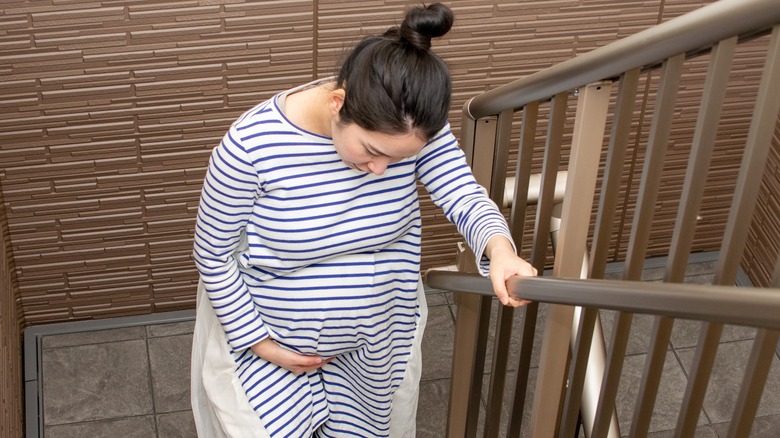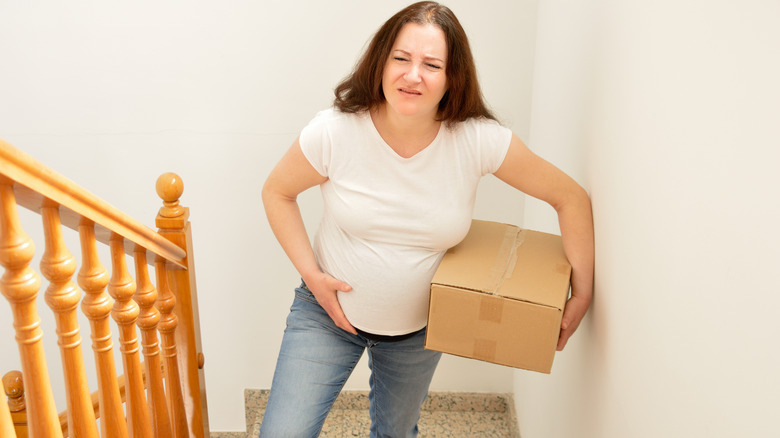Should You Climb Long Flights Of Stairs While Pregnant?
Being pregnant is not an easy experience for any person. Even if the overall journey is free of significant complications, pregnant people often have to endure different types of aches, pains, and unfamiliar symptoms. From having mood swings due to hormonal imbalance to acid reflux to swollen feet, the day-to-day experience of pregnancy throughout the gestation period is far from easy.
Considering that, it is imperative for pregnant people to pay extra attention to their health and well-being by sleeping well, opting for a nutritious diet, and performing regular exercises. Speaking of exercises, doctors encourage expecting parents to maintain a regular workout routine to feel their best and keep their bodies healthy (via WebMD).
However, there are certain types of exercises and physical activities that pregnant people should avoid performing. As explained by WebMD, any pregnant person should steer clear of exercises that put unnecessary strain on the abdominal region or ones that include jarring motions or sudden changes in direction.
But before delving into that, let's take a look at why exercise is good for those expecting.
Why is physical activity important during pregnancy?
Working out during pregnancy is important because it stimulates the flow of blood, prevents back aches and fatigue, and also minimizes the chances of developing pregnancy-related complications, such as gestational diabetes. Moreover, regularly exercising can also help pregnant people build more stamina during childbirth.
According to Dr. Suman Tewari, a Michigan-based obstetrician-gynecologist, there are many benefits of prenatal exercises. "Studies have shown that women who exercise during pregnancy are more likely to have an uncomplicated vaginal delivery and a quicker recovery post-delivery," Tewari told Good Housekeeping.
Tewari added that maintaining a regular exercise routine during pregnancy can be good for the heart and blood vessels, while it can also help alleviate constipation, which is a very common symptom among pregnant people.
Aside from reducing the chances of developing gestational diabetes, Tewari said that people who work out during pregnancy have lower incidences of developing several other complications, such as preeclampsia, lower birth weight, gestational hypertension, preterm birth, and operative vaginal delivery, among others (via Good Housekeeping).
Having said that, many people wonder whether climbing a long flight of stairs during pregnancy is advisable.
Climbing the stairs when pregnant should be done with caution
While it is generally okay for pregnant women to climb the stairs, it is safer during the initial months of the gestational period. This is because you could easily balance your body during early pregnancy.
According to Mom Junction, one should avoid climbing a long flight of stairs during the later stages of pregnancy because balancing the body becomes difficult which, in turn, increases the chances of falling or tripping. During the 37th week of the pregnancy, the baby shifts to the pelvic region, which can make it difficult for you to climb the stairs because of the weight of the baby, per the publication. Under the circumstances, a fall from the stairs during pregnancy can lead to several complications.
If climbing the stairs is absolutely necessary, pregnant women should do it very slowly, make sure they hold the railing for support, take deep breaths, and take one step at a time, as explained by Dr Anita Sabherwal Anand, an India-based consultant obstetrician-gynecologist.
"Climbing stairs during pregnancy poses no harm to the mother or child as long as the expecting woman climbs slowly and holds the railing to steady herself. If she feels dizzy at any point or if the flight of stairs is long and winding, she could stop climbing or avoid the stairs altogether," she told Sitaram Bhartia Institute of Science and Research.


